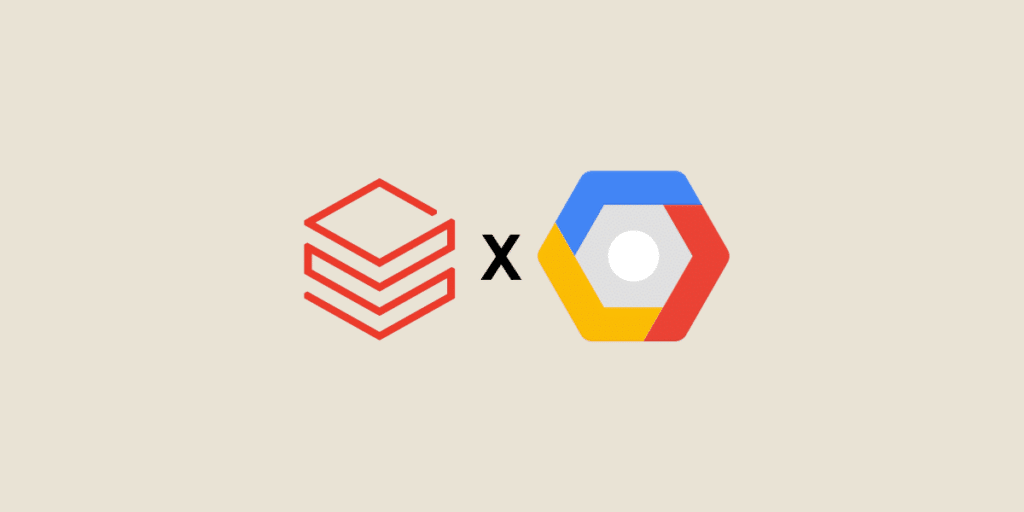Databricks, originally founded by the creators of Apache Spark, is an open source technology for large-scale data processing. In the GCP (Google Cloud Platform) infrastructure, the combination of Databricks and the Google environment offers unrivalled flexibility, scale and processing power.
What is Databricks?
Databricks is a revolutionary unified data platform that has radically changed the way businesses approach data processing, analytics and machine learning.

Data processing and analytics :
At the heart of Databricks is the ability to manage and process large volumes of data. The platform makes it easy to process data in batch or streaming mode, enabling businesses to gain insights in real time.

Machine Learning and artificial intelligence :
Databricks also excels in the field of machine learning. The platform provides an integrated environment for the development of machine learning models, from their creation to their deployment. Databricks facilitates the management of the entire lifecycle of machine learning models, making the process both transparent and efficient.

Collaboration and sharing :
Another fundamental aspect of Databricks is its ability to facilitate collaboration between data teams. The platform offers interactive notebooks, similar to Jupyter, enabling the various data players to collaborate in real time.

Safety and compliance :
Data security is an absolute priority for Databricks. The platform is designed to comply with the most stringent security standards, ensuring that sensitive data is processed and stored securely.
Why Google Cloud Platform?
The integration of Databricks with GCP creates a powerful synergy, taking analytical and data processing capabilities to the next level. Here are the features that justify this choice:

State-of-the-art infrastructure :
GCP is renowned for its global, robust and highly available infrastructure. It is designed to handle heavy and complex workloads, which is essential for large-scale data processing applications.

Analytics and Machine Learning services :
GCP offers an impressive range of analytics and machine learning services, such as BigQuery for data analysis and TensorFlow for machine learning. Databricks’ integration with these tools allows users to leverage the power of GCP for deeper analysis and more sophisticated modelling.

Safety and compliance :
Like Databricks, GCP places great importance on security and compliance. The platform has robust security protocols and complies with international standards, providing businesses with the assurance that their data is managed in a secure environment.

Flexibility and scalability :
GCP stands out for its ability to adapt to changing business needs. Whether it’s a question of increasing storage capacity or boosting computing power, GCP enables fluid scalability. This flexibility is crucial for growing businesses and those faced with variable data requirements.

Integrated ecosystem :
GCP offers a complete ecosystem of integrated services and tools. From data management with Cloud Storage to analytics with Dataflow and artificial intelligence with AI Platform, GCP covers every aspect of the data lifecycle.
Integration of Databricks into Google Cloud Platform
As we have just seen, Databricks’ integration with GCP represents a strategic alliance between two technology giants. Let’s take a look at how this integration benefits businesses in terms of data processing, AI and analytics capabilities.

Optimised data processing :
Users benefit from Google’s state-of-the-art infrastructure. This combination makes large-scale data processing faster and more efficient.

Integration with GCP Services :
Databricks integrates seamlessly with many GCP services. For example, it can easily connect to BigQuery for advanced analysis or to Google Cloud Storage for extended data storage.

Enhanced security :
Both platforms place a high priority on data security and regulatory compliance. When used together, they provide a secure framework for processing sensitive data.

Machine Learning and AI :
Using Databricks on GCP opens up impressive opportunities in the field of machine learning and artificial intelligence.

Versatile use cases :
This integration benefits a multitude of sectors, from finance and healthcare to retail and telecommunications.
Conclusion
The integration of Databricks on the Google Cloud Platform (GCP) represents a turning point in the world of data analysis and machine learning. This combination offers a powerful and flexible platform, capable of managing massive volumes of data with exceptional efficiency and speed. With its extensive data processing, machine learning and high-level security capabilities, this partnership between Databricks and GCP enables businesses of all sizes to transform their data into valuable, actionable insights.
As data and AI technologies continue to evolve, this integration is likely to remain at the forefront, offering ongoing innovation and enhancements to meet changing business needs.










